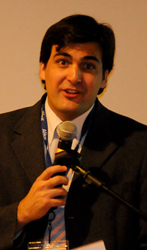Internet Governance on the 10th Anniversary of the World Summit on the Information Society (WSIS +10)
19/03/2013

By Andrés Piazza
Public Affairs Officer, LACNIC.
2013 looks set to become an important year for the discussion about Internet Governance. Ten years on from the First World Summit on the Information Society in Geneva, it is a healthy exercise to promote stocktaking by the different stakeholders involved in the processes (Government, Civil Society, the Private Sector and the so-called Internet Technical Community).
In this context, the UNESCO headquarters in Paris hosted the first World Summit on the Information Society Review Event (WSIS+10) on the 25-27 February. The purpose of the Meeting was to mark the start of the review of the Tunis Agenda. The following can be identified as the main themes emerging from the meeting:
– Human Rights. This is one of the cross-cutting themes that have been added to the Agenda of the Internet Governance Forum at the global level – gradually, over the past few years – and incorporated (in different regions and with their particularities) into WSIS-related processes. In our region, both the eLAC initiative and the Regional Preparatory Meeting for the Internet Governance Forum (LACIGF) have broadened their focus to include issues such as “Universal Access”, “Freedom of Expression on the Internet”, and “Access to Information” as well as “Privacy” or even “Net Neutrality.” In our region, major stakeholders in these fields have participated in both regional and global discussions in recent years.
– Managing Critical Internet Resources / Network Security and Stability. The discussions associated with managing the so-called critical Internet resources (domain names, IP addresses, Standards, and all those related to operational aspects of the Web) played a major role in “animating” both summits. It could be said that since 2005, there has been consensus on the positive role played by the organizations of the so-called “Technical Community” and the positive aspects of what is known as the “Multistakeholder Model of Internet Governance.” Confidence in the “model” has continued and grown stronger in the years that followed – with the exception of some isolated or occasional objections – given the growth that the Internet is still experiencing and the accomplishment of the Tunis goal of “connecting the next billion users.” Notwithstanding the above, these issues remain particularly attractive and have been discussed extensively in intergovernmental circles such as the World Conference on International Telecommunications (WCIT12), among others.
– Enhanced Cooperation. This concept, also coined after Tunis, highlights the significance of strengthening opportunities for cooperation between various constituencies, particularly in terms of the relationship between governments and other stakeholders. Both the global and regional assessments are positive when that relationship has been increased significantly even if there has been no planning or system. In the particular case of Lacnic, active participation as full members of the Inter-American Telecommunication Commission (CITEL) and the eLAC Monitoring Mechanism (where the technical community is recognized as a constituency in itself) are excellent examples of this Enhanced Cooperation.
An important step in this topic will be taken this year. The United Nations’ Commission on Science and Technology for Development, at the express request of the UN General Assembly, will form a Working Group to study Enhanced Cooperation which will be chaired by Peruvian Ambassador Julián Miguel Palomino de la Gala and will comprise 22 members of Government (4 states per each of the five regions, together with the governments of Switzerland and Tunisia – both of them hosts of World Summits on the Information Society) and 20 members of other constituencies. Lacnic is actively involved in these discussions.